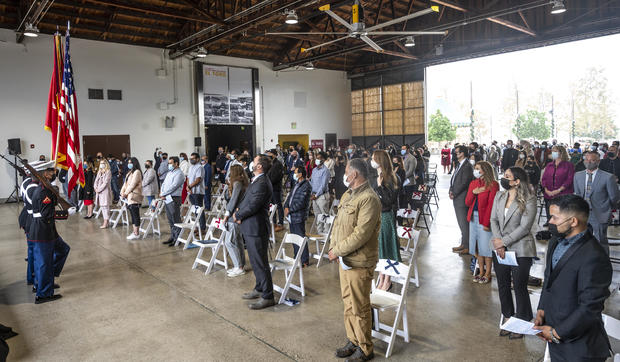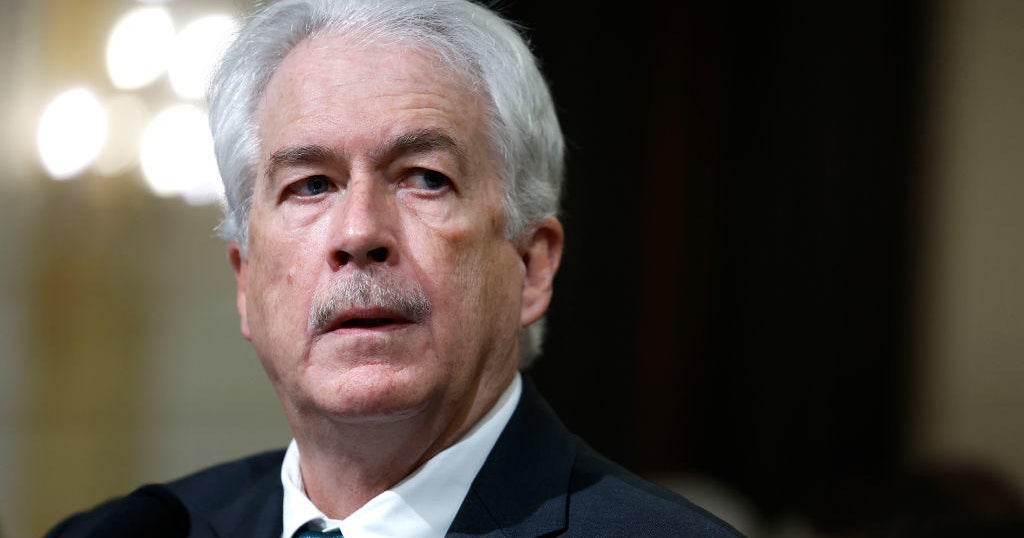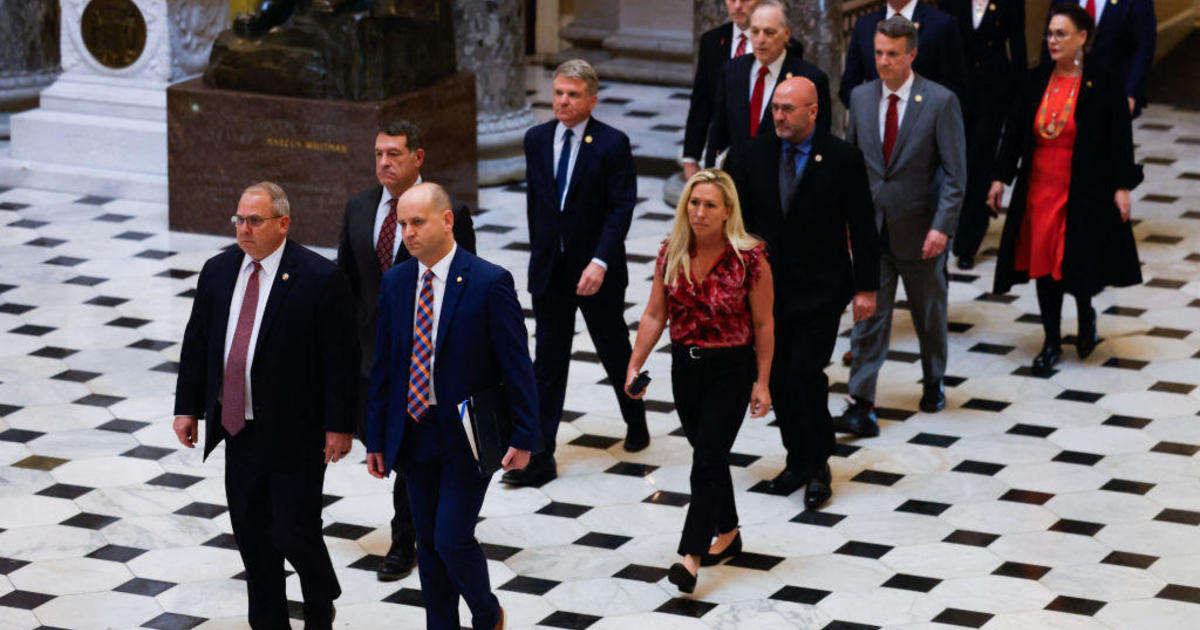U.S. immigration agency moves to cut 9.5 million-case backlog and speed up processing
The Biden administration on Tuesday is announcing three measures to reduce a growing multimillion-case backlog of immigration applications that has crippled the U.S. government's ability to process them in a timely fashion, a senior U.S. Citizenship and Immigration Services (USCIS) official told CBS News.
The agency plans to expand the number of applicants who can pay extra fees to have their immigration petitions adjudicated more quickly, propose a rule that would provide relief to immigrants waiting for work permit renewals and set processing time goals, the official said, requesting anonymity to detail the measures before a formal announcement.
USCIS adjudicates requests for work permits, asylum, green cards, U.S. citizenship and other immigration benefits, including the temporary H-1B program for highly skilled foreign workers and the Deferred Action for Childhood Arrivals (DACA) policy for undocumented immigrants brought to the country as children.
The agency, which is largely funded by fees, has struggled with application bottlenecks and processing delays for years. But the COVID-19 pandemic, which initially led to a shutdown of most global travel, a drop in applications and a suspension of in-person interviews and other services, greatly exacerbated those issues.
As of February, USCIS was reviewing more than 9.5 million pending applications, a 66% increase from the end of fiscal year 2019, according to agency data.
The growing case backlog has dramatically extended application processing delays, trapping many immigrants — from asylum-seekers and green card applicants to would-be U.S. citizens — in a months- or years-long legal limbo that can force them to lose their jobs, driver's licenses and sources of income.
"USCIS remains committed to delivering timely and fair decisions to all we serve," USCIS Director Ur Jaddou said Tuesday. "Every application we adjudicate represents the hopes and dreams of immigrants and their families, as well as their critical immediate needs such as financial stability and humanitarian protection."
The new measures
Among USCIS's new measures is a rule to expand "premium processing," which allows certain applicants to pay $2,500 in extra fees to have their cases reviewed on an expedited basis. Currently, the service is limited to certain applications, including H-1B petitions and some employment-based green card requests.
The rule, set to take effect in 60 days, will expand premium processing to additional employment-based green card applications, all work permit petitions and temporary immigration status extension requests, allowing applicants to pay $2,500 to have their cases adjudicated within 45 days.
Premium processing will expand gradually, starting with work-based green card petitions for multinational executives or managers and professionals with advanced degrees or "exceptional ability" who are requesting a waiver that allows them to immigrate to the U.S. without having a job offer, which is typically required.
The senior USCIS official said the phased implementation will ensure other applications are not delayed by the premium processing expansion, which was authorized by Congress in 2020, when the agency faced a fiscal crisis that threatened to furlough 13,000 employees.
"We can't just shift all our resources to premium filers, while everybody else suffers," the official said.
USCIS is also unveiling another rule to provide temporary relief to immigrants affected by the work authorization delays by extending the period of automatic work permit extensions for those who apply for a renewal, the senior agency official said. The rule was recently submitted to the White House for review.
Currently, most work permit holders who apply for renewals are eligible for an automatic 180-day extension if their authorization to work lapses. However, many immigrants are waiting for their work permit renewals longer than that, often beyond 10 months, USCIS figures show.
"We're regularly unable to adjudicate these renewals, not just by the expiration date, but by those 180 days past the expiration date," the USCIS official said.
USCIS' third measure includes hiring more caseworkers and improving processing technology to meet new timelines for adjudicating applications, which it believes it can achieve by September 2023. USCIS currently has several thousand job vacancies, according to agency data.
The agency will instruct caseworkers to try to adjudicate requests for temporary work programs, such as H-1B and H-2A visas for agricultural workers, within two months. Requests for work permits, travel documents and temporary status extensions or changes should be reviewed within three months.
According to the new processing guidelines, USCIS officers should adjudicate other applications, including those for U.S. citizenship, DACA renewals and green card requests for immigrants sponsored by U.S. family members or employers, within six months.
"It's pretty unprecedented for the director of USCIS to say to the entire agency, to the entire workforce, 'Our processing times are too long, it's inhibiting us from delivering on our mission and so here are the goals that the entire agency is going to pursue and is going to achieve,'" the USCIS official said.
"You're always worried"
Jairo Umana, a political dissident from Nicaragua seeking U.S. asylum, has been waiting for his work permit to be renewed for nearly a year. Because his permit expired, he's working as a roofer in the Miami area using the 180-day automatic work authorization extension. But that is also set to expire on April 14.
As the sole provider for his two children, Umana said he's worried about losing his work authorization and driver's license, which is tied to his work permit.
"It is stressful. You're always worried," Umana told CBS News in Spanish. "Being out of work triggers a chain reaction: there's no income, there's no money for rent, there's no food."
The backlog of applications before USCIS is part of a broader logjam plaguing the immigration system. The Justice Department is currently overseeing 1.7 million unresolved court cases of immigrants facing deportation, while the State Department is handling a backlog of over 400,000 immigrant visa applicants waiting for interviews at U.S. consulates, which limited operations during the pandemic.
The Biden administration has vowed to reduce these backlogs, which it partially attributes to Trump-era policies that cut legal immigration and placed more immigrants in deportation proceedings. USCIS has made bureaucratic changes aimed at speeding up processing, but it still relies on paper records and forms.
As part of a massive spending bill passed by Congress earlier this month, USCIS received more than $400 million to address processing delays and application backlogs. On Monday, President Biden asked Congress to give USCIS another $765 million in fiscal year 2023 to finance the backlog reduction effort.
Conchita Cruz, co-founder of the Asylum Seeker Advocacy Project (ASAP), an organization that works with more than 280,000 immigrants who requested U.S. asylum, called USCIS' proposal to prolong automatic work permit extensions a "huge victory."
"This extension will not only help ASAP members, but will benefit asylum seekers, other immigrant workers, as well as their employers and the communities that rely on their work as doctors, construction workers, truck drivers, software engineers and more," Cruz said.
Lynden Melmed, the top lawyer at USCIS during the George W. Bush administration, said Tuesday's announcement shows the agency recognizes the urgency of its case backlog and processing crisis — and its humanitarian impact on applicants and economic consequences on U.S. employers.
"At a time where every company is struggling to find workers, it is rubbing salt to a wound to have to terminate a worker because the government can't process a four-page application in over a year," Melmed told CBS News.





